|
|
review | notes | availability | |
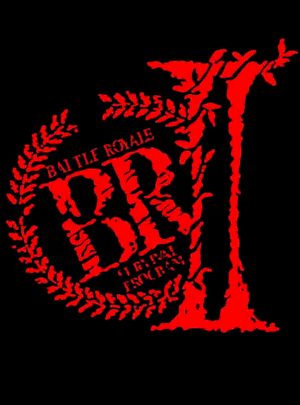
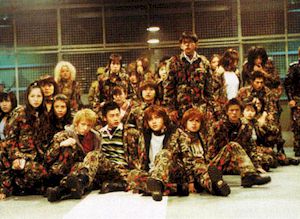
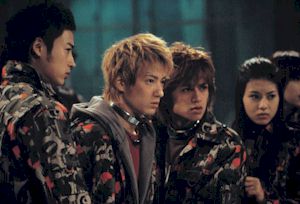
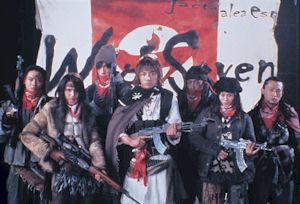
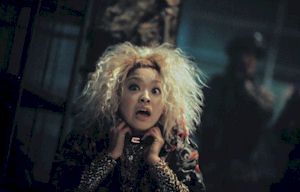
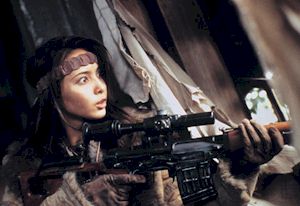
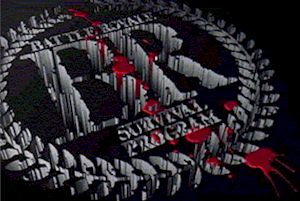
Availability:
DVD (Hong Kong)
Region 3 NTSC
2-Disc Special Edition
Universe Laser
Widescreen
Japanese Language Track
Dolby Digital 5.1 / DTS 5.1
Removable English and Chinese Subtitles
Various extras, trailer, featurette
Notes:
• Elderly director Kinji Fukasaku, who helmed the original
Battle Royale and countless other films over his
storied career, died shortly after the filming of Battle
Royale II commenced. Diagnosed with cancer before shooting
began, he decided to go ahead and concentrate on the sequel
anyway. After his passing, his son Kenta, whose original
idea inspired Battle Royale II, took over directing
duties.
• Ai Maeda, the actress who plays Saori Kitano, is actually
the sister of Aki Maeda, who played Noriko Nakagawa in both
Battle Royale and the sequel.
• Ai Iwamura, who played the smiling, bloodied winner seen
in the opening moments of the original Battle Royale,
appears briefly in Battle Royale 2 as a member of
Wild Seven.
• Sonny Chiba has a brief cameo as the uncle of Mimura,
the computer whiz from the first Battle Royale. As
detailed in various other media (the comic book from Tokyopop,
the translated novel from Viz), Mimura's uncle was a self-proclaimed
revolutionary who fought the good fight and taught Mimura
everything he knew about sticking it to the man. Sadly,
Chiba's screentime barely musters a minute.

|
|
|
Review
by Kozo: |
Back in 2001, the original
Battle Royale dropped onto the Asian film community
like a cinematic megaton bomb. At once a nail-biting action
thriller, an over-the-top satire on the reality TV craze,
and a veiled commentary on Japanese society, the film hit
a chord with audiences worldwide—except in the United
States, where it has been relegated to import DVDs and "Have
you seen this flick?" party chatter. America's decision
to stay out of the Battle Royale party was understandable.
After all, the film's very premise—forty-one junior
high students are dropped onto an island with random weapons,
and asked to kill one another before three days are up,
or THEY ALL DIE—is something that wouldn't fly in a
post-Columbine world. Bad enough that the film was about
kids killing one another; heaven forbid that anyone imply
that it's adults who condone and even promote the killing.
Media powderkegs seldom come supplied with shorter fuses.
Enter Battle Royale II,
a sequel which may one day typify the statement, "The
sequel was unnecessary." Instead of the first film's
enclosed reality show environment, the events of BR2
are painted on a larger, potentially more explosive canvas.
Shuya Nanahara (Tatsuya Fujiwara), one of the two survivors
of BR1, has become a wanted criminal for his terrorist
activities as the leader of Wild Seven, a terrorist group
made up of disaffected youngsters and other Battle Royale
survivors. Wanted for the wanton destruction of several
metropolitan buildings (two of which eerily resemble the
Twin Towers), Wild Seven has since become the worldwide
bad guys du jour. To combat their existence, the
Japanese government have created Battle Royale 2, which
isn't the film, but a new "game" designed to set
teenager against teenager. The kids are kidnapped like in
the first film, indoctrinated by their complicit instructor
Riki Takeuchi (played by V-Cinema kingpin Riki Takeuchi),
and bullied into taking arms against their fellow post-pubescents.
However, the rules have changed.
Instead of offing each other, the kids are sent to the island
retreat of Wild Seven with the following mandate: kill Shuya
Nanahara before three days are up or everyone will die via
their stylish explosive collars. True to the original game,
the collars are set to explode when tampered with, or when
the wearers stumble into pre-determined "danger zones."
One new rule is an assigned partner, who will get offed
via collar if you get offed via any other method—two
for the price of one, if you will.
Why such a harsh penalty is instituted
is anyone's guess, but it makes for more blood and exploding
throats than anyone could possibly want. Battle Royale
II ups the violence considerably from the original,
and as the kids storm the beaches of Wild Seven's stronghold
(ala Saving Private Ryan), the players start getting
dropped left and right. Wild Seven apparently has no qualms
offing fellow BR participants, but in truth they haven't
figured out that the kids rushing to their doom are sequels
to their previous exploits. Eventually, the BR2 team will
come face to face with their quarry Shuya Nanahara, which
begs the question: will it be BR1 vs. BR2? Or will they
join forces to take down the mean adults, who should really
find less expensive ways to punish their wayward youth?
Or will they just sit around and talk for two-plus hours?
Sadly, other than the first
half horrors and a climactic action sequence, the kids do
sit around and talk for far too much time, which is where
Battle Royale II eventually falters. The first film,
while questionably realistic or even dramatically sound,
had one undeniable hook: its kids-kill-each-other scenario
could affect in untold ways depending on who was watching
it. The kids were types, but recognizable ones, and the
issues that arose—trust or betrayal, friendship or
survival, complicity or rebellion—grabbed each individual
in myraid different ways. Much of what could be gleamed
from the original BR depended on what you brought
to the table, and though not everyone enjoyed the film,
you'd be hard pressed to find someone who didn't come out
affected by it.
The same cannot be said for
BR2. The deaths of the kids happen too quickly, and
in an escalatingly gruesome fashion. When they finally meet
Nanahara, there really is no need to count who's dying and
how many are left; all tension as to who offs whom has been
completely done away with. Instead, we get soul searching
on a variety of subjects. Nanahara's terrorist tactics should
be appealing to some of the BR2 participants; will anyone
defect? Saori Kitano (Ai Maeda), daughter of dead teacher
Kitano (Takeshi Kitano from the first BR), volunteered
for BR2 to meet her father's killer; what's her damage?
The world nations, and one nameless superpower in particular,
want Wild Seven taken out, even at the cost of common sense
or traditional diplomacy; will Japan cave to the Western
bullies? And what about the minor romances of the BR2 team?
And why the hell does Riki Takeuchi—as Riki Takeuchi,
mind you—start chewing up amphetamines and overacting
egregiously?
The answer to that last question
is obvious: this is Riki Takeuchi, who can't do anything
but act up an unnecessary storm via yelling and funny faces.
As for the rest of the film, it's hard to say exactly what
buttons the filmmakers were trying to push—except the
obvious post-911 one. A central conceit of the film is its
implication of a certain world power in its military diplomacy,
or debatable lack therof. Nanahara's Wild Seven is a terrorist
organization not unlike the ones you read about in the morning
paper—does getting into their heads tell us anything
about what's going on in the world today? There are flashbacks
to war-torn countries (Afghanistan? Iraq?), where the overriding
sentiment seem to be this: kids will smile no matter where
they are. Is Nanahara a visionary or a perpetrator? Are
the choices the kids make damning or heroic? And again,
does all this make for a good film?
The easy answer: no. Unlike
the first Battle Royale, there is no solid dramatic
element for the audience to latch onto. Battle Royale
2 is certainly technically impressive, and there is
a visceral feel to the blood and guts that gets spewed across
the screen. But to what end it all happens is totally debatable.
It's possible that a second or third viewing could solidify
what BR2 is trying to say. Then again, multiple viewings
could simply support what the film initially appears to
be: a soggy mishmash of undercooked and overdone acting,
uninspired personal drama, and questionable socio-political
rhetoric. Even if the content strikes the occasional chord,
that doesn't mean the movie is good.
There are probably viewers who
will enjoy BR2 for its easy-to-digest 911 commentary
or its over-the-top action, but it really bites off way
more than it can chew. Aside from its murky meaning, the
film is rife with plot holes, ridiculous developments, and
just plain silly stuff. Death and killing can certainly
hit a nerve, but since when does Riki Takeuchi appearing
in rugby gear AND an explosive collar (at a climactic point
in the film, no less) rate as solidly earned drama? Why
should the audience care if Nanahara is punished for or
gets away with his terrorism? Should we root for him because
he's cute? Or decry what he does because Dubya probably
would? You can decide for yourself what to get from the
Battle Royale II experience, but if you were floored
by the first film, then this much is clear: BR2 is
no BR1. (Kozo 2004)
|
|